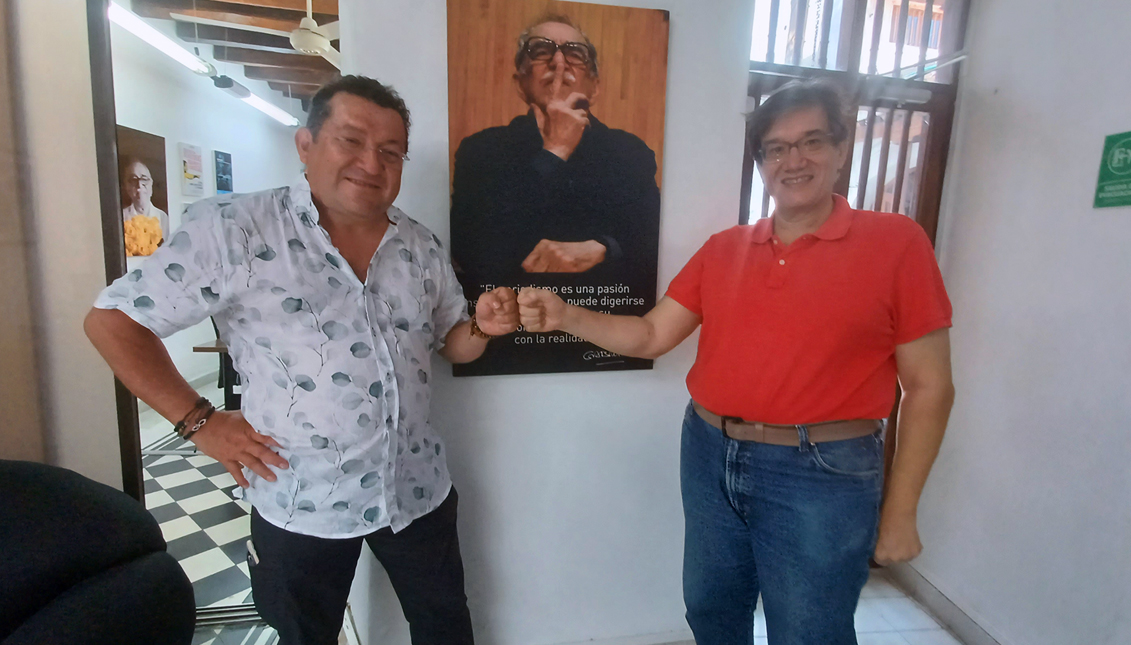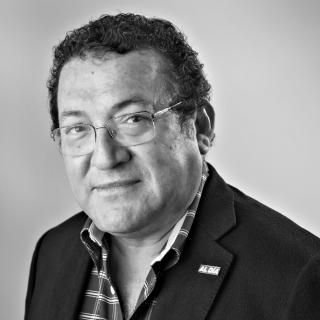
García Márquez, The Journalist | OP-ED
The mansion García Márquez and his wife Mercedes Barcha probably only occupied days when they were alive, although they worked hard for decades to own it, is…
Every time I pass by it I can’t help but think of the penniless man who had to sleep on a park’s bench his first night in Cartagena, whose celestial ceiling often blesses each night the homeless with a sky full of stars, one huge moon plus a milky way populated by giants dragons and tiny angels flying away from dusk to dawn.
Out of money to pay for a miserable room bed in the Gethsemane neighborhood of Cartagena — the quarters of the slaved and the poor of the former financial capital of the Spanish empire — the man who would go on to become the most famous Colombian the world over, had to lay down his body in his early 20s on the cold stone of a public park bench, before being arrested by the police, stone-cold, for such a public nuisance violation.
It’s plain funny that when the man went to sleep forever, his body already turned into ashes, and was the reason for a slight diplomatic dispute between two governments who claimed the right to keep the now prestigious remains because, in the expert opinion of their representatives, that dust belonged to that other dust of two different countries:
Mexico, where he found refuge for over 40 years? Or Colombia, where he was born and lived a good portion of the first 40?
A Solomonic solution, possible only in Macondo, the magic realism of his "100 Years of Solitude," was devised, giving the country of his birth half of the jar, and the country of his exile the other half.
Mercedes Barcha, his wife, the very practical woman she must have been gladly approved that knuckled-head man’s proposed solution before any of them would change his mind.
“...A raucous journalist who dared to take on an authoritarian national government of Colombia, all by himself..”
A picture could be taken then in Mexico City, where he died, and all of those government officials would be smiling, gladly posing in it — the people who love him sincerely and also those who profoundly hated his guts when he was alive —all because he was the raucous journalist who more than once dared to take on an authoritarian national government of Colombia, all by himself, after that government decided to go after him and put into confinement in a military barrack, under arrest because the state-of-siege, and for being the friend of notable radicals and also for the resolute writer freely calling call things by its real name.
His electrical typewriter, which was hastily moved away from his house in Bogotá. when he decided to vacate it and ask for asylum at the Mexican Embassy, was described by a fellow journalist as “a powerful machine gun”...
His electrical typewriter, which was hastily moved away from his house in Bogotá when he decided to vacate it and ask for political asylum at the Mexican Embassy, was described by a fellow journalist as “a powerful machine gun” — was then harmless as it lay down on the patio’s floor of that house — but feared by powerful politicians when Gabo could reach to the keyboard with one hour of time to spare.
Garcia Márquez’s ashes were finally split evenly between Colombia and Mexico.
His earthly journey over, asleep in his eternal sleep, Gabo probably was smiling at his fellow human being’s follies, stretching his long mustache made in Arabia and the sarcasm of his white marble teeth showing under that jet-black hair of his.
I do not quite grasp why those same government officials in his native Colombia haven’t figured out what is pretty obvious today:
RELATED CONTENT
Turn the spacious home he could never live in into a Museum by the ocean, where the man can be literally brought back to life.
For the enjoyment of thousands of men and women from all over the world that would visit Cartagena just for the opportunity to glimpse at Gabo’s socks, or his fellow poet from Cartagena Luis Carlos Lopez’s “Old Shoes,” or his “Underwood” first typewriter, or the “Pullman” bed he finally was able to afford in the Caribbean city he tried unsuccessfully to make his second home in his native country that, in the end, both loved and loathed him, as it happens in the good families.
“A Tour to Gabo’s House” in Cartagena, Bolívar, Colombia, may be in the works from what I gathered during my last four-hour visit this past week to Fundación Gabo.
“A Tour to Gabo’s House” in Cartagena, Bolívar, Colombia, may be in the works from what I gathered during my last four-hour visit this past week to Fundación Gabo, the institution he founded here and that his good steward, Jaime Abello Banfi, has kept alive for 26 long years with the help of committed staffers that venerate García Márquez.'s memory.
On to the good news, #ALDIALists all over the world:
AL DIA Media Educational Foundation, from Philadelphia, will work with Gabo’s Foundation, from Cartagena, on the obvious need to integrate, reconcile, and bridge the North and South, which has proved elusive to generations, specially those few visionaries, bilingual, bicultural, and Pan-American journalists — el maestro Germán Arciniegas being just one of the three I admire the most
That is, along with Don Gabriel García Márquez, the Literature Nobel Prize winner who considered, at times, fiction secondary to his quick trigger’s first love:
JOURNALISM!










LEAVE A COMMENT:
Join the discussion! Leave a comment.